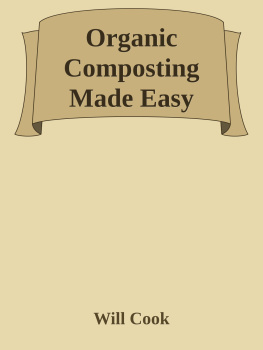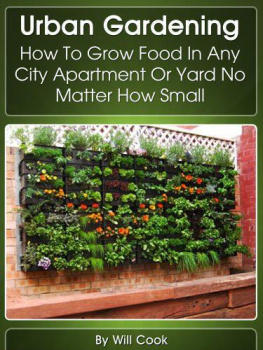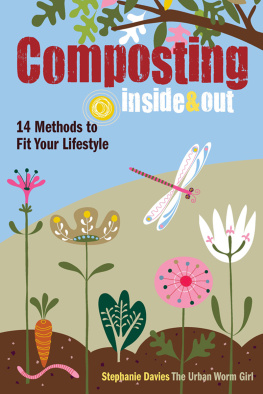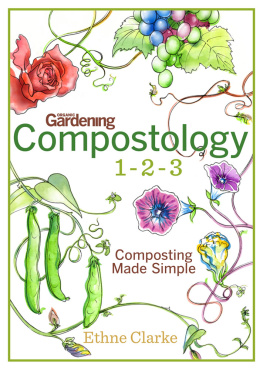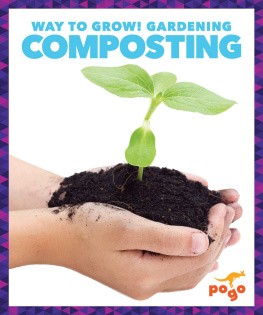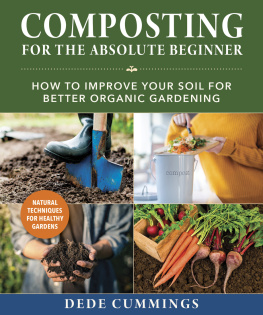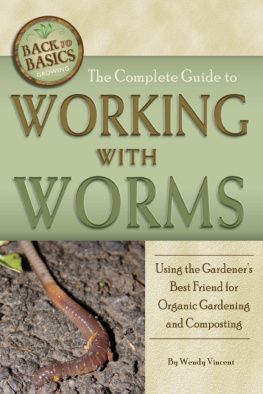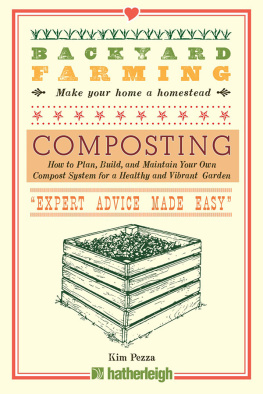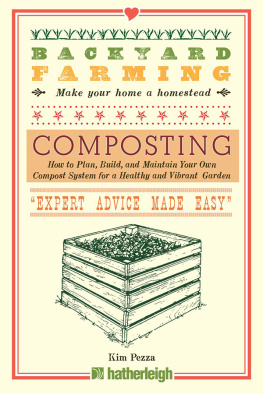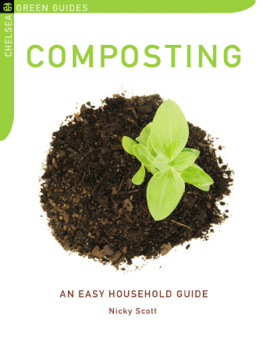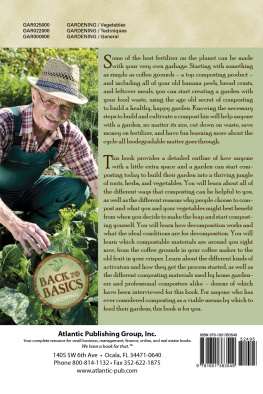Organic Composting Made Easy
How To Make Your Own Compost and Grow a Healthy Garden Without Pesticides or Chemical Fertilizers
Will Cook
Copyright 2013 by Will Cook. All Rights Reserved.
No part of this publication may be reproduced, distributed, or transmitted in any form or by any means including photocopying, recording, or other electronic or mechanical methods, or by any information storage and retrieval system without the prior written permission of the author, except in the case of very brief quotations embodied in critical reviews and certain other non-commercial uses permitted by copyright law.
Published by TCK Publishing
www.TCKPublishing.com
Get discounts and special deals on books at
www.tckpublishing.com/bookdeals
Want to connect with like-minded gardeners from all over the world? Come join us on Facebook to share your indoor gardening questions, ideas, pictures, and be a part of the global gardening community!
Join us at on.fb.me/HmllNU
Table of Contents
Introduction

Composting is something that comes naturally. Most people dont like to think of it, but it is really the process of decay, or decomposition, a most natural and vital process that enables the cycle of life to continue. Without organic matter yes, that includes humans breaking down into its component parts, soil would just get depleted of essential nutrients needed to grow and sustain plants, trees, and other vegetative matter so that they will all eventually die. Without decay, the whole world would slowly turn into a big desert, so theres no reason to get all upset and wrinkle your nose at the thought of decomposition.
Composting is just a process that controls and helps along decomposition. Composting is the process of organic material decomposition and recycling to create compost , which can either be the end product in itself or a secondary material. Compost potentially contains several nutrients and minerals essential to organic farming and related activities, such as gardening and agriculture, and is normally used as a natural fertilizer and as soil enhancers or conditioners. It also helps in the mitigation of soil erosion as well as the construction of wetlands.
Ready-to-use, good, quality compost (sold as soil conditioners or fertilizers) are available commercially at reasonable prices so why do we want to make our own compost? Do-it-yourself composting is a good thing because it means that whatever organic material we produce from our daily lives is recycled right in our own backyard. These are the materials we will not be sending to already overburdened landfills that are not only eyesores but are also compromising the environment. Uncontrolled decomposition releases methane into the air, exacerbating the greenhouse effect that we all know only too well. Methane is 21 times worse than carbon dioxide when it comes to heating up the planet and melting those ice caps.
Uses of compost

Compost is usually suggested as an improver to topsoil, or additional mediums such as peat and coir, providing nutrients and humus. It supplies a rich medium for growing plants or, alternatively, a permeable, porous material that retains water and soluble minerals, supplying the sustenance in which vegetation can grow. It is seldom used on its own; it is mainly combined with soil, bark chips, clay granules, sand, grit, perlite, and to vermiculite to make up loam. Compost can be cultivated straight into the soil to improve the level of organic material and the general richness of the soil. Compost that is prepared for use as an improver is rich brown, almost black, with a sweet, earthy smell.
Usually, direct sowing into compost is not advisable because of the rapidity at which it dries out and the possible existence of phytotoxins that might hinder sprouting, as well as the likely connection of nitrogen by partly composted material. It is quite common to have combinations of 30% compost used for resettling sprouts.
Composting can do away with toxins or undesirable weeds. Weeds can be prevented from growing by layering the topsoil with compost. The bacterial insecticides in compost may consist of thermophiles and mesophiles, but certain composting insects such as red worms and black soldier fly larvae are also thought to lessen many pathogens. Hot heap composting is known to terminate most weeds and disease-bearing substances, with the exception of prions. The disinfecting abilities of hot heap composting is wanted when disease is high risk, such as when using manure. This is particularly true in humanure composting.
History of composting

Composting dates back at least to Pliny the Elder. Conventionally, composting was simply heaping organic materials together while waiting for the following planting season. By that time, the ingredients would have decomposed sufficiently for use in the soil. The benefit of this process was that it required little time or effort and fit naturally in with agrarian practices in moderate temperatures. Nowadays, the drawback is the space is used for an entire year, nutrients might leach into the soil because of rainfall, and pathogens and bugs may not be effectively controlled.
Modern composting began in Europe in the 1920s as a complement to organic farming. The first industrial composting set up was in Austria in 1921. Notables in the farming world include Rudolf Steiner (who founded the farming method called Biodynamics), Annie Franc-Harrar, Sir Albert Howard, and Lady Eve Balfour. Composting in the US was brought in by people like J.I. Rodale (who founded Rodale Organic Gardening), E.E. Pfeiffer (who practiced biodynamic farming), Paul Keene (who founded Walnut Acres in Pennsylvania), and Scott and Helen Nearing (who stimulated the back-to-nature movement in the 1960s.)
Modern advocates of quick (hot heap) composting endeavour to overcome some of the problems associated with slow (cool heap) composting. Many claim that composting can be done in as little as 2 to 3 weeks. These alternative techniques make use of smaller, more regulated material in the compost, keeping the carbon to nitrogen ratio at 30 to 1 or less and more carefully regulating moisture levels.
There is no right way to composting; as long as decomposition happens, then its all good. However, there are some materials that dont do so well because they do not meet the criteria for quality compost. We will be discussing those criteria in the next part of this eBook.
You can do composting any way you like, but there is a way to do it in an environmentally-friendly or organic way. We will first define the criteria for good, quality composting and a general overview of the process of composting.
Chapter One: Understanding the Composting Process
Historically, farmers knew that compost improved the soil and made plants grow better, but they did not know why. The chemical process that dictates composting has only unfolded over the last 50 years but whether industrial or backyard compositing, the same principles apply. In order to get the best possible compost with available material, optimum environments needs to be provided for rapid decomposition, and these need the inclusion of various organisms.
The Little Guys

Next page
